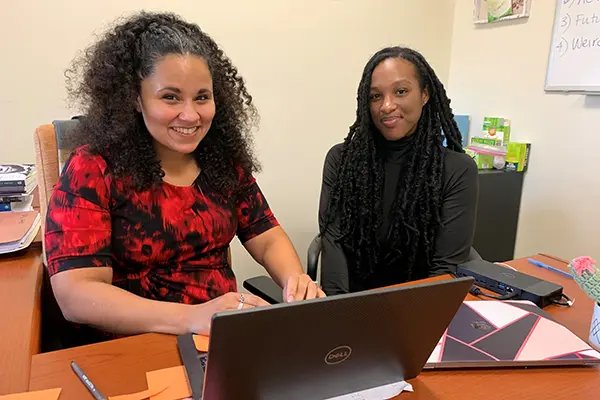Recent Faculty Hires, Research Opportunities Support the Program
 Image by K. Webster
Image by K. Webster
10/14/2022
By Katharine Webster
Sociology Asst. Prof. Chandra Waring became acutely aware of her biracial identity at an early age, when her family moved from a military base in Germany to Moody Air Force Base in Valdosta, Georgia, in the early 1990s.
“In Germany, my racial consciousness was not fully formed, but when we got to Georgia, I got a real quick lesson: Mama’s white, Daddy’s Black and that’s a no-no,” Waring says.
Her family received “terrifying” death threats, although living on base offered them some protection. So Waring was relieved when, several years later, her father retired and they moved to New London, Connecticut, a city with a very diverse population, including many multiracial families.
“New London is considered ‘ghetto,’ very brown and low income, but after living in the Deep South, it was healing for me to be someplace so racially diverse,” she says. “I was allowed to be who I am.”
Today, Waring’s research focuses on the identities and experiences of multiracial people. She says that research on race and ethnicity is expanding rapidly and will continue to grow, motivated most recently by the exploding racial justice movement, the backlash against it, and the U.S.’s changing demographics.
In the 2020 U.S. Census, largely due to more precise questions about race and ethnicity, nearly 34 million people – more than 10% of the population – identified as biracial or multiracial, compared to less than 3% a decade earlier, and nearly every racial category except for “white only” saw significant growth.
Student interest in understanding and addressing racial injustice has also grown, and starting this fall, the Sociology Department is offering a new major concentration in racial equity and inclusion. (The College of Fine Arts, Humanities and Social Sciences also offers an interdisciplinary minor in Race and Ethnic Studies.)
The groundwork was laid several years ago when the Sociology Department began hiring faculty doing research on race and ethnicity, says Prof. Mignon Duffy, who chaired the department for seven years prior to fall 2021.
“We thought it was a critical area for our department, the university and the larger world,” Duffy says.
When Waring came to UMass Lowell in fall 2020, she quickly saw the potential for a new concentration. Now she and Asst. Prof. Stephanie Ortiz, who researches racism and sexism at work and in new media, are co-directing it.
The department celebrated the launch in early October with a virtual panel discussion featuring scholars of color from across the country. The event was attended by nearly 200 students.
Other newer faculty supporting the concentration include Asst. Prof. Maheen Haider, who researches immigrants with a focus on Asians and Muslims, and Lecturer Jordan Ellis, who studies the experiences of students of color in education.
The new faculty are also able to offer paid and for-credit research opportunities to students, Waring says.
Kimani Brown, a senior sociology major from Boston with a minor in education, will be one of the first students to graduate in the new concentration. After Brown worked hard in three classes taught by Waring, including two that Waring had developed – Race and Families, and Race, Gender and Film – Waring invited her to work as a paid research assistant over the summer.
Brown and another student, Feriel Boudif, reviewed and summarized recent academic research on biracial and multiracial people that was related to Waring’s work on an upcoming paper discussing themes in the advice her research subjects offered for younger multiracial people: “Be Confident, Creative and Careful.”
The three met weekly to discuss their findings.
Brown, who identifies as Black and Caribbean American, says that even though she had taken required classes in qualitative and quantitative research, the job with Waring gave her a much more in-depth perspective on the research process.
This fall, through a directed study, Brown is assisting Waring with a paper looking at how multiracial adults envision the future of race relations. Brown is also revising her own qualitative research paper on how middle-schoolers of color in a predominantly white school perceive beauty so that she can submit it to a peer-reviewed journal.
Brown, who plans to become a social worker in the field of foster care, says she is excited to be doing more research with Waring, who has also encouraged her in her plans to apply to graduate schools.
“She thought I could make a contribution,” Brown says. "She's a great mentor."
Although Boudif, an Honors College sophomore whose parents are from Algeria, is a biology major, she loved her Introduction to Sociology class with Waring and is hoping to complete a sociology minor.
“I’ve always wanted to go into the medical field, and I feel like having a sociological background could really help me with that, especially understanding people’s racial and ethnic backgrounds,” she says.
Boudif says she was fascinated by what she learned about research and the experiences of multiracial people, especially from reading Waring’s recent paper, “Appearance, Parentage, and Paradox: The White Privilege of Bi/Multiracial Americans with White Ancestry,” published in the American Sociological Association journal “Sociology of Race and Ethnicity.”
“There’s a lot of focus on race right now, but people generally underestimate the struggles that biracial and multiracial people face,” Boudif says.




